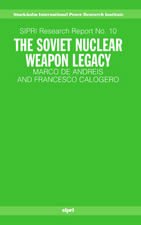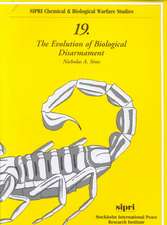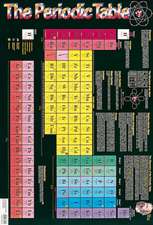Nuclear Weapons and Law: Contributions in Librarianship and Information Science,, cartea 31
Autor Unknown Editat de Arthur S. Miller, Martin Feinrideren Limba Engleză Hardback – 30 noi 1984
This book presents a rounded critique of the conventional wisdom about the legality of nuclear weapons by experts in international and constitutional law. Part I addresses the status of nuclear weapons under international law. Scholars on one side of the question draw upon treaties and international custom to argue that most uses of nuclear weapons are illegal and that even mere possession of such weaponry is legally unjustifiable. Others argue that law cannot be imposed on the nuclear weapons states without their consent and that nuclear weapons provide deterrence that binds the superpowers in a peaceful balance of power. Part I concludes with a comprehensive bibliography on nuclear weapons and international law. Part II, the section that focuses on nuclear weapons and American constitutional law, offers widely divergent approaches and conclusions. Although there is no explicit prohibition of such weapons in the United States Constitution, several contributors suggest that the advent of nuclear weapons has so changed the milieu in which constitutional institutions operate that many accepted conclusions must be reexamined. Part III explores the effects of nuclear weapons on the environment and the medical consequences of nuclear war.
Din seria Contributions in Librarianship and Information Science,
- 51%
 Preț: 252.39 lei
Preț: 252.39 lei - 55%
 Preț: 149.99 lei
Preț: 149.99 lei - 36%
 Preț: 465.19 lei
Preț: 465.19 lei - 43%
 Preț: 295.37 lei
Preț: 295.37 lei - 31%
 Preț: 283.56 lei
Preț: 283.56 lei - 28%
 Preț: 461.00 lei
Preț: 461.00 lei - 27%
 Preț: 439.60 lei
Preț: 439.60 lei - 38%
 Preț: 344.82 lei
Preț: 344.82 lei - 47%
 Preț: 151.04 lei
Preț: 151.04 lei - 42%
 Preț: 271.22 lei
Preț: 271.22 lei - 38%
 Preț: 345.74 lei
Preț: 345.74 lei - 38%
 Preț: 345.49 lei
Preț: 345.49 lei - 38%
 Preț: 436.57 lei
Preț: 436.57 lei - 24%
 Preț: 362.02 lei
Preț: 362.02 lei - 45%
 Preț: 385.61 lei
Preț: 385.61 lei - 28%
 Preț: 438.00 lei
Preț: 438.00 lei - 34%
 Preț: 207.28 lei
Preț: 207.28 lei - 42%
 Preț: 422.44 lei
Preț: 422.44 lei - 33%
 Preț: 322.40 lei
Preț: 322.40 lei - 51%
 Preț: 254.18 lei
Preț: 254.18 lei - 34%
 Preț: 559.72 lei
Preț: 559.72 lei - 33%
 Preț: 319.83 lei
Preț: 319.83 lei - 28%
 Preț: 344.47 lei
Preț: 344.47 lei - 24%
 Preț: 461.35 lei
Preț: 461.35 lei - 40%
 Preț: 509.02 lei
Preț: 509.02 lei - 27%
 Preț: 439.51 lei
Preț: 439.51 lei - 41%
 Preț: 312.84 lei
Preț: 312.84 lei - 33%
 Preț: 320.87 lei
Preț: 320.87 lei
Preț: 442.56 lei
Preț vechi: 710.47 lei
-38% Nou
84.69€ • 91.97$ • 71.14£
Carte tipărită la comandă
Livrare economică 22 aprilie-06 mai
Specificații
ISBN-10: 0313242062
Pagini: 415
Dimensiuni: 156 x 234 x 24 mm
Greutate: 0.78 kg
Editura: Greenwood Press
Seria Contributions in Librarianship and Information Science,














